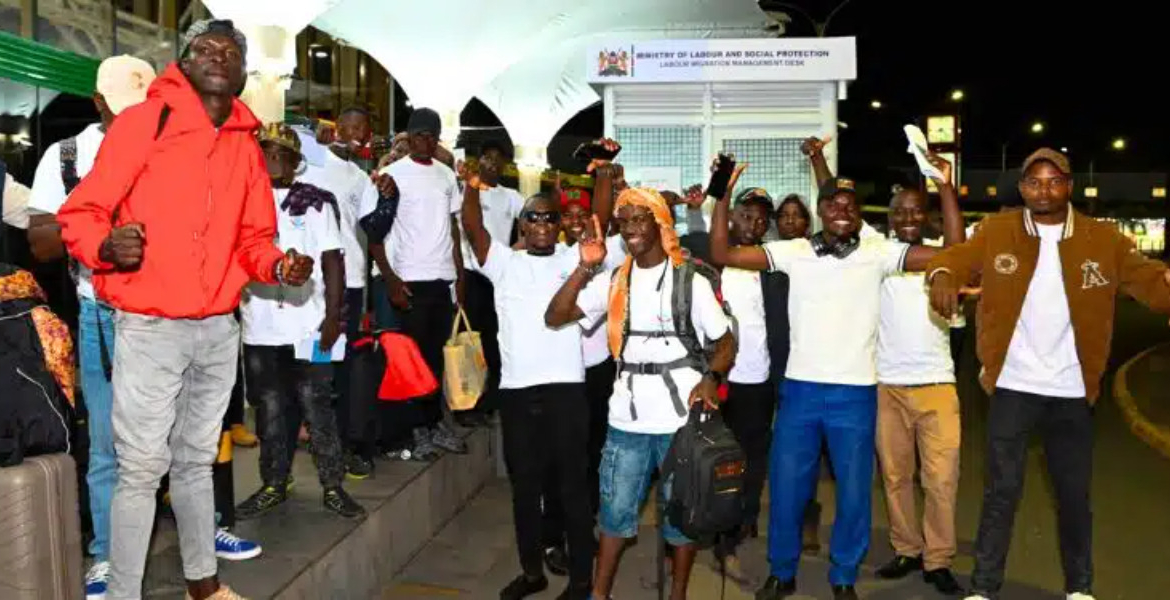Kenyan Construction Workers Secure Jobs in Iraq, Qatar, Russia Through Kazi Majuu Program

Over 100 Kenyan workers have departed the country under the government's Kazi Majuu initiative, a labour export program designed to tackle rising unemployment by facilitating structured migration.
The workers, who left from Jomo Kenyatta International Airport (JKIA), are headed to countries including Iraq, Qatar, Russia, Dubai, and Serbia, where they will primarily take up positions in the construction sector. The deployments mark a significant step in the government's strategy to address Kenya's unemployment challenges, which have been exacerbated by a struggling domestic job market.
The Kazi Majuu program, spearheaded by the Ministry of Labour, aims to connect Kenyan job seekers with opportunities in foreign markets where labour demand is high, offering the prospect of better wages and improved economic prospects for their families. As the workers boarded their flights, many expressed optimism about the opportunities awaiting them abroad.
The promise of higher incomes, compared to similar jobs back home, has fueled hope for a better future and the ability to support their families more effectively. Some participants have publicly defended the initiative, dismissing opposition as based on misinformation and political interference, urging fellow Kenyans awaiting visa approvals to trust the process.
However, the Kazi Majuu program has not been without its critics. Concerns have been raised over the transparency and execution of the initiative, with some questioning the government’s ability to ensure worker protection and fair recruitment practices. The program's success hinges on upholding ethical standards, transparency, and long-term benefits for the workers involved.
Labour Cabinet Secretary Alfred Mutua has defended the program's credibility and success, stating that several batches of Kenyan workers have already begun employment overseas, with more scheduled for deployment in the coming months. Mutua emphasises that the initiative was designed to provide safe and structured labour migration, ensuring that workers receive dignified opportunities and protection from exploitative conditions abroad.
The Senate Committee on Labour and Social Welfare recently summoned CS Mutua to address concerns over recruitment practices under the Diaspora Jobs Program. Lawmakers raised alarms after receiving testimonies from Kenyans who alleged they had been promised jobs abroad, only to end up stranded and in debt. The committee specifically referenced recruitment drives held in late 2024 at Kabete National Polytechnic and the Kenyatta International Convention Centre (KICC), which had drawn thousands of hopeful applicants.
Candidates reported falling victim to misinformation, facing prolonged waiting periods, and unexpected challenges, despite the government promoting these drives as a gateway to economic prosperity. Despite the controversies, some Kenyan workers who successfully secured placements under Kazi Majuu defended the program, insisting that their experience had been fair and transparent. Many spoke of their long wait for approval and expressed gratitude for the opportunity to work abroad.
One worker, Reuben Wahome, urged critics to refrain from politicising the initiative, stating, “We have waited for a very long time, but we are finally going abroad.”
The prospect of Kenyan workers taking up employment abroad is not new, but Kazi Majuu is distinctive in its approach to formalising labour migration. Unlike previous informal job placements, this program aims to streamline the process, ensuring that departing workers have contracts, clear terms of employment, and protection from exploitative conditions. Mutua reiterates that expanding labour export partnerships would continue to be a priority for the government, signalling that thousands more Kenyans may soon find opportunities beyond the country’s borders.
Concerns over worker welfare remain pertinent—historically, Kenyan labourers in Gulf countries have reported cases of mistreatment, wage disputes, and contract violations. The government’s ability to enforce protections and hold foreign employers accountable will likely determine whether Kazi Majuu achieves long-term success.








Add new comment